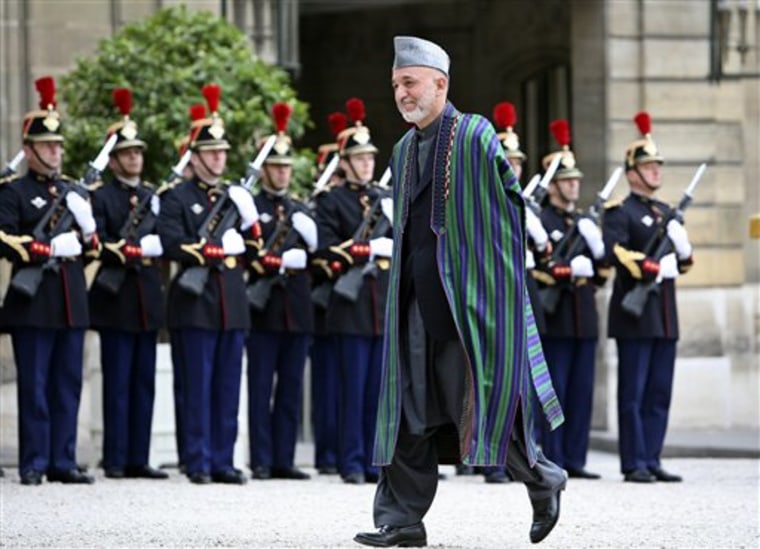He came to power billed as the world's best hope for a renaissance in Afghanistan after years of war and radical Islamic rule. Now, patience abroad with President Hamid Karzai is wearing thin, experts say.
His government is weak, corruption is widespread, the drug trade is booming, and Taliban insurgents and their al-Qaida allies are increasingly troubling his troops and their international military backers.
Karzai's sponsors feel they have little choice but to go on backing him, and last week world donors in Paris pledged $20 billion in aid. Some say it is less a show for him than for his country, and a recognition that the rich world is ready to pay almost any price to keep Afghanistan from reverting to the lawless terrorist haven that incubated the Sept. 11 attacks.
"The international community is disappointed with him — but in the absence of an alternative, naturally continues to support Afghanistan," said Karim Pakzad of Paris' Institute of Strategic and International Relations.
Karzai has hinted that he plans on running in Afghanistan's presidential election next year, and speculation is widespread about who might be his top challenger.
Abroad, Karzai has support where it matters most for him — in Washington. Even if it too has shown signs of Karzai fatigue, the United States remains his chief benefactor, and pledged about half the total at the Paris conference to drum up support for Afghanistan.
Support to continue
Many experts and diplomats expect U.S. backing of Karzai to continue through the end of President Bush's tenure. One of Bush's top priorities in his current European trip has been to lobby allies to contribute more money and troops for Afghanistan.
U.S. officials call Karzai a strong leader but have tempered their praise of his performance recently, partly to lessen the impression among Afghans that their leader is a U.S. liege, and partly because the Bush administration has recognized the limits of Karzai's will and ability.
U.S. Assistant Secretary of State Richard Boucher said that the emphasis many speakers at the Paris donors conference placed on upcoming Afghan elections does not mean donor countries are looking past Karzai or seeking an alternative.
"The sense is that everybody wants there to be a good election, and we're not voters," said Boucher, the top U.S. diplomat for the region. "We'll assist and support in the Afghan election process but it's the Afghan voters that will decide who they want to elect, not us."
Problems surface
While the United States has led the effort to defeat the Taliban, Europe has focused its money on the roots of Afghanistan's troubles: poverty, lack of education and poor infrastructure among the biggest ones.
"Of course, it's President Karzai who gets the support of the international community," EU External Relations Commissioner Benita Ferrero-Waldner told The Associated Press. "In the future of course, there will be other personalities, but for the moment it is still him."
Some experts bemoan what they see as steps backward. Karzai's government has tried to ban Indian soap operas on Afghan TV considered by some Afghan conservatives as too out-of-line with their traditional values.
That underscores the crux of Karzai's problem: reforming a country that in many ways seeks to resist modern, Western ways even as influences pour in from abroad.
With the international community, Karzai has to balance his efforts to win financial and military support while not coming across as a foreign puppet to his compatriots. Some Afghans complain that many foreign aid workers and experts reap funds in the rich financial support packages destined for the country.
Few doubt the progress in Afghanistan since the U.S.-led ouster of the former Taliban regime in 2001. Karzai, the only leader the country has known since then, impressed many abroad with his cool demeanor, plans for reform and appeal to a broad support base among his war-weary countrymen.
Envoys at the Paris conference credited gains under Karzai — notably in education, health care, democracy and women's rights — and acknowledged the challenges he has faced to rebuild and stabilize Asia's poorest country. But many expressed concern about corruption, delays in privatizing state companies, lags in infrastructure projects and hiccups in getting aid out to the neediest.
'Lucky to have you'
The Afghan leader drew plaudits when he swooped in nearly unheralded in 2001 as a political leader after U.S.-led forces toppled the Taliban regime, known for its brutality and hard-line Islamic laws. He is an unmistakable presence with his trademark chapan — a traditional Uzbek coat — and ceremonial karakol hat that have impressed many in the fashion world.
In Paris, Karzai pointed to progress but acknowledged there is "a long way still to go before our country achieves lasting peace, sustainable development, and an enduring democratic system of government."
Many envoys in Paris pinned hope for future progress in Afghanistan on the new U.N. representative, Kai Eide. The most effusive praise for Karzai came from French President Nicolas Sarkozy, the conference host.
"Your country is lucky to have you," Sarkozy told Karzai.
Karzai has pointedly criticized U.S. actions at times. In January, he accused Britain and the United States of damaging security in the restive southern Helmand region by dismissing the province's governor without having a proper replacement.
Britain, whose ties with Karzai's leadership have soured, nonetheless pledged $1.1 billion for Afghanistan through 2013 — a sign that many allies are willing to look past his shortcomings for now.
"He has frustrated some of his key allies — and I'm sure there's repressed anger at some of the things he's said and done — but nevertheless they've continued to support him," said Christopher Langton of the International Institute for Strategic Studies in London.
